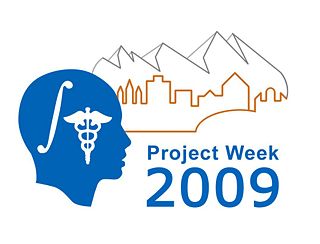Two-tensor tractography in Slicer using Python and Teem
 Return to Project Week Main Page |
Key Investigators
- BWH: Madeleine Seeland
- BWH: Carl-Fredrik Westin
- BWH: Gordon Kindlmann
Objective
We are developing methods for registering peri-procedural electrophysiological data showing sites of RF energy application (called Carto data) in the left atrium, with post-procedural MRI data, which shows regions of scarred left atrium (see figure above), using an interative closest point algorithm (Z. Malchano et al). The goal is to measure the distance between scar by MRI and ablation sites (Carto data) by EP.
Approach, Plan
Our approach for comparing the locations of scar to sites of RF ablation is summarized in the ISMRM 2008 reference below. The main challenge to this approach is to measure the distance between each scarred pixel, and each RF ablation site, and then the distance from each RF ablation site, to the nearest scarred pixel. <foo>.
Our plan for the project week is to first try to measure the closest distances between MRI scar and Carto data <bar>,and then to measure distances between Carto data and closest scar. We also wish to colorize the Carto surface, based on voltage data. We also wish to streamline the MR angiography segmentation method.
Progress
Software for the registration between electrophysiology Carto data and the MR angiogram has been implemented, using the ITK/VTK platform (see ISMRM 2008 abstract, Taclas et al, and figure above). This week we wrote code to quantitatively determine the distances between each ablation location, and the closest region of scar, and to determine the distances between each pixel of scar, and the nearest ablation point. Therefore we accomplished our goal!